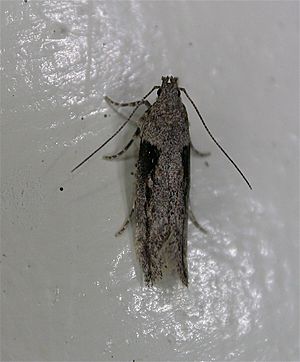Symmetrischema tangolias facts for kids
Quick facts for kids Symmetrischema tangolias |
|
|---|---|
 |
|
| Scientific classification | |
| Kingdom: | |
| Phylum: | |
| Class: | |
| Order: | |
| Family: |
Gelechiidae
|
| Genus: |
Symmetrischema
|
| Species: |
S. tangolias
|
| Binomial name | |
| Symmetrischema tangolias (Gyen, 1913)
|
|
| Synonyms | |
|
|
The South American potato tuber moth (scientific name: Symmetrischema tangolias) is a small moth. It is also known as the Andean potato tuber moth or tomato stemborer. This moth belongs to a family called Gelechiidae.
This moth originally comes from South America. However, it has spread and is now found in many parts of the world. It has been seen in places like North America, Australia, and New Zealand.
About the Moth
The South American potato tuber moth is quite small. Its wingspan (the distance from one wing tip to the other when the wings are spread out) is about 20 millimeters (which is less than an inch).
What it Eats
The young moths, called larvae, are known as pests. They mainly cause damage to potato plants (Solanum tuberosum). These larvae attack different parts of the potato plant. They can harm the potato tubers (the underground part we eat), as well as the stems and leaves of the plant.
Life Cycle
After the larvae have grown enough, they change into pupae. This stage, called pupation, usually happens among the leftover pieces of the plant they were eating.
 | May Edward Chinn |
 | Rebecca Cole |
 | Alexa Canady |
 | Dorothy Lavinia Brown |

